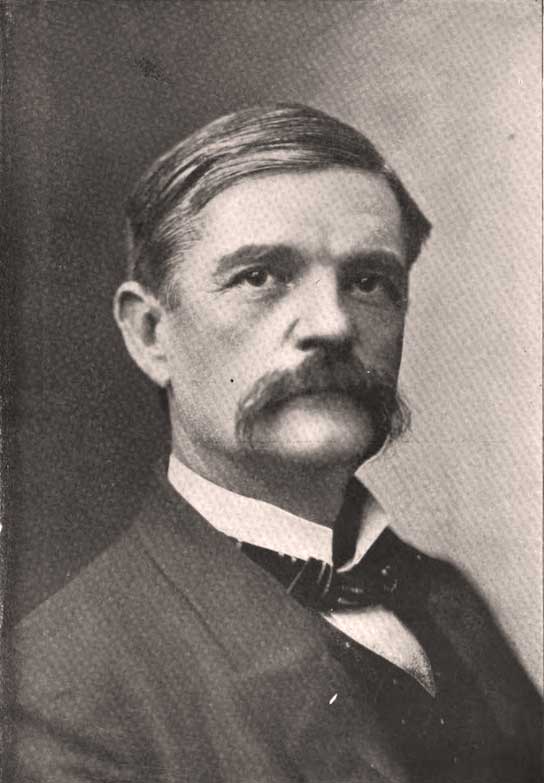God TRANSFORMED Sam Jones from an Alcoholic into an Evangelist

[Sam Jones from The Life and Sayings of Sam P. Jones, a Minister of the Gospel by his wife. Atlanta Georgia: The Franklin-Turner Co., 1907]
WHILE William Tecumseh Sherman’s troops ravaged Georgia toward the end of the American Civil War, seventeen-year-old Sam Jones took refuge in Kentucky. There he met Laura McElwain. Soon they became engaged. But as their wedding day neared, McElwain hesitated. Jones had become a lawyer who hobnobbed with hard-drinking men. Family had to persuade her to keep her commitment. McElwain’s fears proved well-founded. Within four years of their 1868 marriage, her husband’s alcoholism and gambling had ruined them. Sam was reduced to shoveling coal.
Laura pleaded and prayed, seemingly to no avail. Her husband would sober up temporarily, only to fall back into alcoholism. His addiction was so bad he would even beg bartenders to let him drink the dribbles left in the bottom of dirty glasses after other drinkers went home. Sam would later preach from his experience, “A Christian girl runs a great risk when she marries a sinner,” and “Quit drinking, boys. It’ll drive the roses from your wife’s cheeks, and they will never come back again.”
Both Laura and Sam were to experience events that they considered to be divine interventions. While on a six-week drinking binge, Sam Jones learned that his father was dying. He staggered to the bedside where his father, newly converted to Christianity, pleaded with his boy to meet him in heaven. Jones promised. Afterward, he begged a drink from a bartender. Suddenly he saw his vomit-covered reflection in a mirror. He smashed the glass and fell to his knees, begging God for mercy. Three days later, sobered by strong coffee in a cheap boarding house, he bought new clothes and went home to the wife he had recently abused.
“Honey, God has given you a new husband and the children a new daddy, and I wonder if you will forgive me and start all over again.” She grabbed me in her arms and cried, “Hallelujah! Hallelujah! I have been praying for this!”
Jones testified to his intent to follow Christ in a Methodist church where his grandfather was pastor. Urged by his grandfather, he preached his first sermon a week later. Before long, he accepted a call to minister to a circuit of churches. Laura Jones was not happy. She reminded him she had married a lawyer, not an itinerant preacher. Sam Jones replied that God had called him and would remove any obstacles. She responded, “Well, he’ll have to remove me then.”
That night she became so sick she feared God was removing her. She vowed that if she recovered, she’d be the best pastor’s wife she could be. Laura did recover. Sam grew his circuit so much in three years that his increased salary allowed him to pay off his debts. He went on to become a notable traveling evangelist, calling people to turn from their meanness. He could preach only because Laura remained home caring for their children. One of his responsibilities was to raise funds for an orphanage. She found that ironic, because he spent so little time with his own offspring. Not surprisingly, most of the Jones children became addicts or otherwise lived contrary to their father’s teaching.
When his daughter Mary contracted blood poisoning and was said to be beyond recovery, Sam telegraphed a friend in Mississippi for prayer. Meanwhile papers printed Mary’s obituary. The friend telegraphed back that God had told him at 5 p.m. that Mary would recover—the very time she turned for the better. Sam later asked his friend why he had telegraphed after she was reported dead. The friend replied, “If every paper in the United States told me she was dead, I would not have believed it, for God told me she would recover.”
Sam preached across the eastern United States, drawing huge crowds because of his gospel message and wit. Typical of his quick thinking was the time a saloon keeper waved a ten dollar bill in front of the evangelist, saying he bet Sam would like the money. Sam snatched the ten, saying the devil had had it long enough. His sermons were laced with quotable lines:
They will put you in jail for stealing a man’s money, but you can be an average church member and steal a man’s character.
Going to heaven is just like riding a bicycle. You have to keep a-going to keep a-going. You got to keep a-moving—you can’t stop.
His most successful evangelistic series began on this day 10 May 1885 in Nashville. Hundreds converted and joined local churches. Among them was Tom Ryman, the owner of a steamboat line that had provided whiskey, wagers, and women. He built Sam a tabernacle in gratitude. Beginning in 1943 it housed the Grand Ole Opry and, after the Opry moved in the 1970s, continued to host some Opry shows.
Sam got drunk at least once after entering the ministry and elders of his church had to restore him. The last year of his life he had to drop to his knees again and again, he said, pleading for strength to withstand the temptation to return to his old habit. On 15 October 1906 he flopped over dead—one day before his fifty-ninth birthday. Thirty thousand gathered to pay homage while his body lay in state in Atlanta and thousands more gathered at railroad depots to pay their respect as a train carried his remains home to Cartersville, Georgia.
—Dan Graves
- - - - -

Russ Taff: I Still Believe is also a story of alcoholism and love. Watch it at RedeemTV.
Other Events on this Day
- Comgall Founded a Famous, World-Changing, Monastery in Ireland
- "SHOW YOUR MOM YOU LOVE HER BEFORE IT IS TOO LATE," URGED ANNA JARVIS






